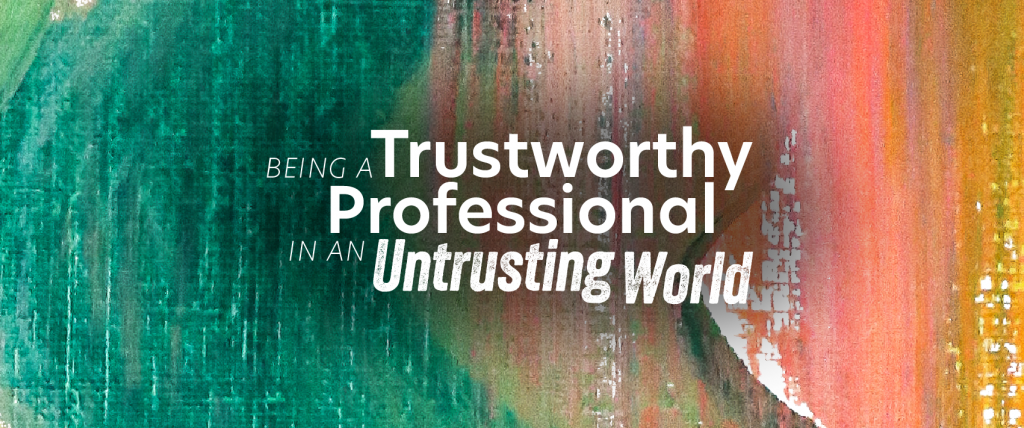- Medical Professionalism
- The Physician Charter
- Building Trust
- Health Equity & Inclusion
- Choosing Wisely®
- Grants
- ABIM Foundation Forum
- 2025 Reimagining Professionalism: Hope in a Shifting Medical Landscape
- 2024 Being a Trustworthy Professional in an Untrusting World
- 2023 Reframing Trust – A Path to Address Misinformation
- 2022 Fact or Fiction – Strategies for the Misinformation Age
- 2021 Pursuing Trust – Striving for Equitable Health Care
- 2020 Building Trust & Health Equity
- 2019 [Re]Building Trust – A Path Forward
- 2018 [Re]Building Trust
Leaders and experts from across health care gathered for the 2024 ABIM Foundation Forum to discuss how the medical and scientific communities can maintain and restore trust and become more trustworthy in our increasingly polarized society. Participants worked over three days to develop actions to acknowledge, redress and build systems to prevent future trust breaches.
President’s Lecture
Dannagal G. Young, PhD (University of Delaware) delivered this year’s President’s Lecture—the Forum’s keynote address—exploring how misinformation spreads and the media’s role in amplifying it. Her solution to addressing harmful misinformation is addressing the deeper motivations behind false beliefs, empathizing with people’s needs, and reminding them of non-polarizing identities.
Young explained that human behavior is driven by the “three C’s:” comprehension, control, and community, arguing that these needs are often met better by fiction than reality. She shared her personal experience with conspiracy theories during her husband’s illness, emphasizing how group identity influences beliefs and behaviors.
She warned that America’s increasing polarization has led to two dominant “mega-identities,” which drive extreme views and dehumanize opposing groups. Media companies exploit these divisions for profit, promoting emotional and identity-driven content, as people often cling to falsehoods to maintain group acceptance.
The root problem, according to Young, lies in the media’s economic incentives and broken political systems, which fuel identity-driven misinformation.
The Medical Student Perspective
Three medical students—named as Wolfson Scholars after winning the Foundation’s 2024 Building Trust Essay Contest—delivered speeches based on their essays, in which they reflected on their experiences with building trust.
- Margaret Sorg (University of Kentucky College of Medicine) shared how she helped her brother-in-law overcome his distrust of the health care system by listening to his concerns and providing empathy and support regarding his son’s tonsillectomy. She emphasized that lived experiences often overshadow rational knowledge, and how listening is key to fostering trust.
- Kaveri Curlin (University of California, Irvine School of Medicine) spoke about a Chinese-American teenager in a psychiatric unit who initially resisted treatment due to cultural stigma around mental health. A fellow clinician helped the patient open up by addressing his fears about family therapy, illustrating that mutual respect and understanding of cultural backgrounds can empower patients to take difficult but important steps.
- Ella Eisinger (Perelman School of Medicine at the University of Pennsylvania) recounted a patient grieving his son’s death while struggling with alcohol use disorder. Her attending physician built trust by engaging with the patient compassionately ultimately resulting in his staying for rehab. Despite the patient’s decision to leave early, Eisinger reflected that trust is about supporting patients even when their path may diverge from clinical recommendations.
New Perspectives on Trust
Tony Mills, PhD, MA (American Enterprise Institute) and Sara Gorman, PhD (Critica) both highlighted how mistrust in health care stems from a lack of competency, integrity, and equitable access, which can lead to severe consequences for patients.
Mills argues that building trust in medicine relies on competency (the ability to perform tasks efficiently) and character (acting according to standards of integrity, including disinterestedness and organized skepticism). Mills warned that distrust arises when experts overreach particularly during times like the COVID-19 pandemic, when experts were perceived to exceed their competence and restrict others without restraint.
Gorman discussed how mistrust in health care can lead to dire consequences. Based on interviews for her book, The Anatomy of Deception, she shared a story of a woman who, feeling abandoned by the health care system, shunned medical care and died after refusing to seek help. Gorman identified access and inequity as key drivers of mistrust—when people cannot access care or perceive it as unequal, trust is eroded.
She proposed studying trust longitudinally to target interventions when trust is higher and encouraged health care institutions to address disparities and engage patients in discussions about political and social issues.
The Healthcare Trustworthiness Theory of Change
Kedar Mate, MD (Institute for Healthcare Improvement) introduced the Healthcare Trustworthiness Theory of Change, which was designed to help institutions build trust, drawing on individual trust-building theories from Frances Frei (authenticity, empathy, logic) and population-level theories from Darity and Mullins (acknowledgment, restitution, closure).
Aim: To rebuild and strengthen trust with communities and clinicians of a health care system
Primary Drivers:
I. ACKNOWLEDGE past breaches of trust
II. REDRESS & CLOSE trust gaps in the present
III. BUILD SYSTEMS to strengthen trust for the future
Reflections and Key Takeaways
The Forum concluded with a reflection and conversation about key takeaways from the meeting. Dannagal G. Young emphasized intellectual humility and the importance of expanding social circles and identities. Tony Mills echoed the humility theme, suggesting that experts acknowledge the limits of their authority.
They discussed the balance between humility and expertise, with Young advocating for clearer, more human communication from experts and Mills suggesting that experts present their conclusions as informed judgments rather than certainties.
Summary Paper
2024 ABIMF Forum
Background Paper
2024 ABIMF Forum


